Illustrated Comic or Satirical Publications in Afro-Americana Imprints, 1535-1922
The current release of Afro-Americana Imprints, 1535-1922: From the Library Company of Philadelphia includes several illustrated comic or satirical works published in the 19th century.
Life and Adventures of Jeff. Davis (1865)
By McArone
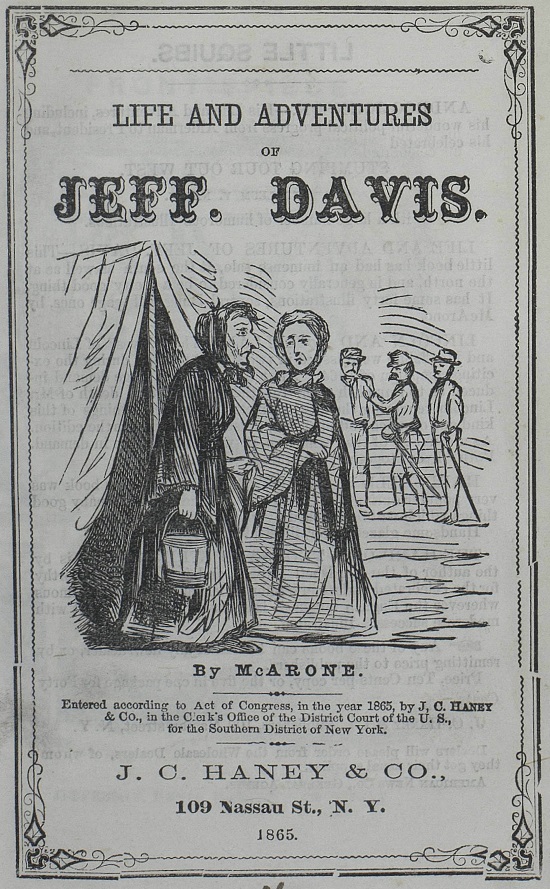
This satirical account of Jefferson Davis includes illustrations which are derisive in their treatment of the only president of the Confederate States of America.
On the 18th of February, ’61, Jeff. Was formally inaugurated to his new position, with Aleck Stephens as his Vice-President. It was said at the time that a president, with so few virtues, could hardly need a vice.
Both of these gentlemen are reported to have been very much tickled.
On the 4th of March ensuing, Mr. Lincoln was inaugurated, and took the place of the poor, paltry, pattering, puny old public functionary, Buchanan, who had earned some reputation by being caricatured in the funny papers, but had no other claims to be considered otherwise than in the light of a poor shoat.
After the Battle of Bull Run—"the first battle of the war that could be considered much more than a skirmish"—Davis “was on the ground in person and modified Peter Beauregard’s plans just enough to spoil them entirely.” Davis arrived in Richmond and “accepted the entire credit of the victory, in a most gracious manner.”
Meanwhile, Peter Beauregard’s gentlemanly and scholarly heroes were disemboweling the wounded for bowie-knife practice, and making whiskey-goblets for their sweethearts out of the skulls of the dead. Jeff., having now some foundation for popularity, became the idol of the party. They proclaimed the Confederacy a fixed fact, and demanded its recognition by foreign powers. They extolled Jeff. As the Saviour of the South, and the most admirable descendant of the cavaliers that ever licked a [slave] or propagated half-breeds. In a word, things flourished in the Confederacy, and Jeff’s. darling dreams seemed in a pretty fair way to come to something. These were his palmy days. He dwelt at Spottswood House, ate the fat of the land and the fullness thereof, drank blockade-running champaigne [sic], and squandered his ingeniously-contrived currency, based upon the old but ever popular financial principle of “heads, I win; tails, you lose.”
McArone’s savage history eviscerates Davis. His entire presidency is presented as a farcical exercise in self-dealing and gross incompetence. The Confederacy was collapsing, but the first family had specific concerns.
Dreary, indeed, were these last days of the Confederacy. Mrs. Davis saw with pain that the joyous spring-time was coming, and yet she knew not what sort of bonnet to get, for she could not say in what quarter of the world her season might pass. Possibly in some remote and unfriendly region where bonnets are unknown.
The subsequent attempt by Davis to escape his inevitable fate is treated with acrid contempt.
Through the swamps and fens, where the miasma and hoptoad had it all their own way; over corduroy rod and slopes of timber where no white man had ever traveled or ever will travel without feeling hurt when he sits down, went Jeff., the fugitive President, accompanied by his family, a few dare-devil dragoons, and a small wagon train.
His ill-gotten specie soon disappeared. The carts containing it broke down, and the lucre was instantly taken in trust for Jeff. by a large number of soldiers, negroes, citizens, and others, who doubtless intended remitting it to him in a letter as soon as he got settled.
McArone concludes his narrative with the ignoble capture of Davis which was enthusiastically and widely believed to be true throughout the Union. This story has been largely discredited by historians, but it was much too delicious to scruple Davis’s contemporaries. Accordingly, Davis was said to have dressed as a woman in order to escape his captors being found out when an alert Yankee perceived that the “old lady” was wearing hob-nailed boots under her crinolines.
Kicking, scratching, biting and behaving in an otherwise feminine manner, Old Mother Davis was seized and conducted to Colonel Pritchard’s headquarters, while Mrs. D. came after, averring in shrill accents—
“You’d better not meddle with Mr. Davis; he may hurt some of you!”
Davis and his party were transported to Fortress Monroe where Davis found cause for complaint with the food stating
...it was not “the kind of thing to which he was accustomed,” &c., &c. This was indeed probable, for since Jeff. has been eighteen years of age he has been fed at the expense of Uncle Sam—with the interval between 1861 and 1865 (when Jeff. left his old boarding-house) and that old gentleman keeps a tolerably good table.
Subsequently, Davis’s family was dispatched…
…sent to Richmond, and thence South, in a few days. He did not feel able to accompany them for obvious reasons. Indeed, after arriving at Monroe, he kept his room quite scrupiously [sic], receiving hardly any company, and leading a decidedly retired life.
And finally, the last paragraph accented with a grim drawing of a hangman’s noose:
What the close of his seclusion may be, I know not at this present writing, but I can express what it should be, according to the verdict of the American people, in this simple
illustration that follows, and which alone can fitly end the Life of Jefferson Davis.
Davis was released two years later and was pardoned by Andrew Johnson. He died at age 81.
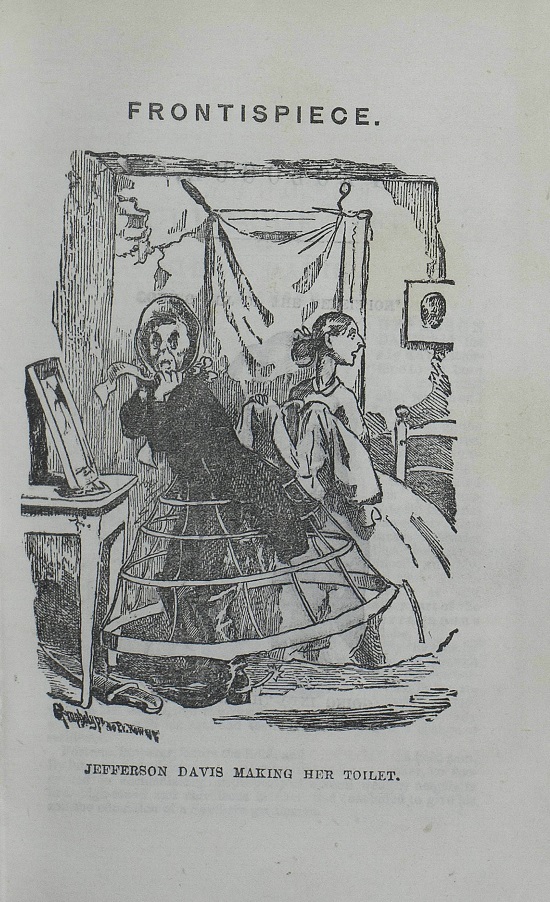
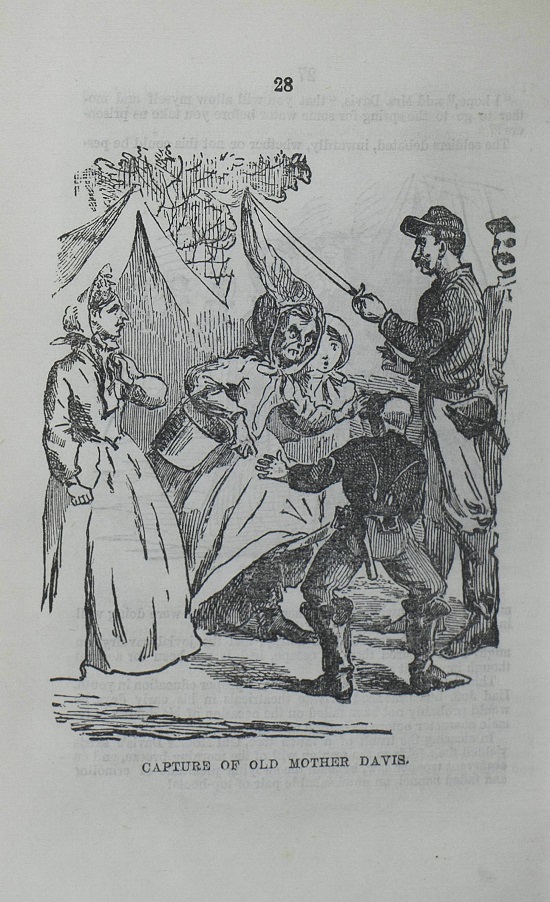
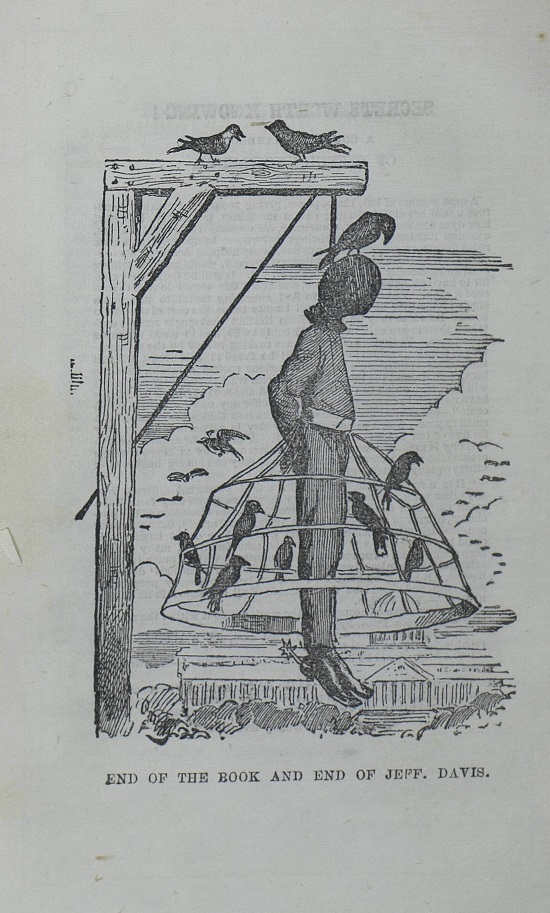
The American War Cartoons (1874)
By Matt Morgan and other English artists with illustrative notes
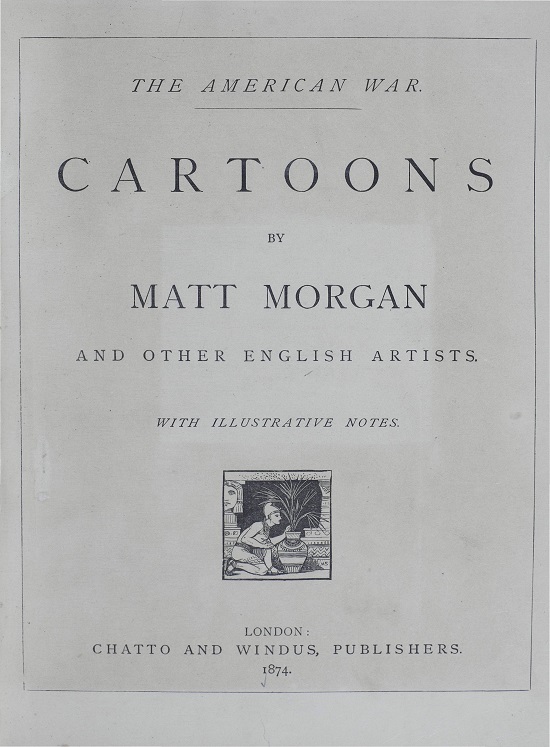
Matthew Somerville Morgan (1837-1890) was an artist who achieved success as a theatrical scene painter and cartoonist. He gained a certain notoriety by attacking the royal family. This imprint depicts Morgan’s views on the American Civil War. The text includes succinct commentary. Some examples:
General Garibaldi was importuned, according to newspaper report, to lend his sword to the Northern states in the struggle. The artist has depicted him enjoying his cigar under the shade of his own vine, in his little Monte Christo-like Island of Caprera, whilst the conventional Yankee, on his own shores, off which the stars and stripes trails in the mud, solicits him to assume command of an awkward squad. The Italian, whose mind is bent upon other themes, calmly refuses the post of honour.
The eve of the actual conflict was full of the most reckless and trifling with the worst passions of man. Bearing the motto “Pendente Lite” (During Darkness being, perhaps, the sting suggested), the cartoon represents the two antagonists playing with fire and powder. The convivial beverages have hardly yet been laid aside. The flag of the United states has become already a mere carpet for the trampling feet.
The first important action was that where the army advancing from the capital was disastrously hurled back. It is designated the “Battle of Bull Run,” from the creek of that same name.
The artist has placed upon the theatre of war the representative components of the Federal legions—the Irishman, the negro, and the German.
The satire is legitimate, since the Americans of the cities were in all cases sharp enough to make themselves officers, while the uneducated foreigners were gladly received as the rank and file.
There are scores of illustrations.
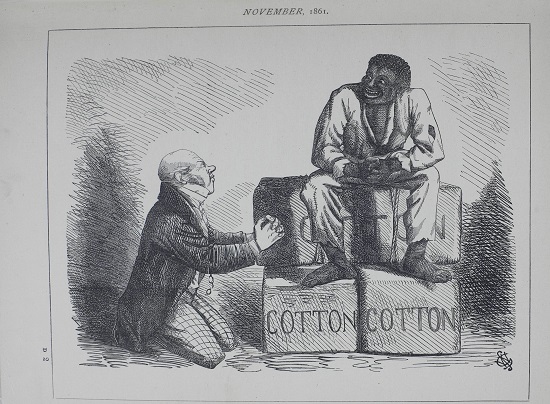
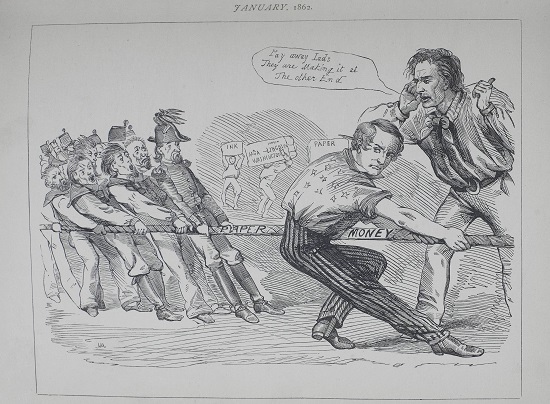
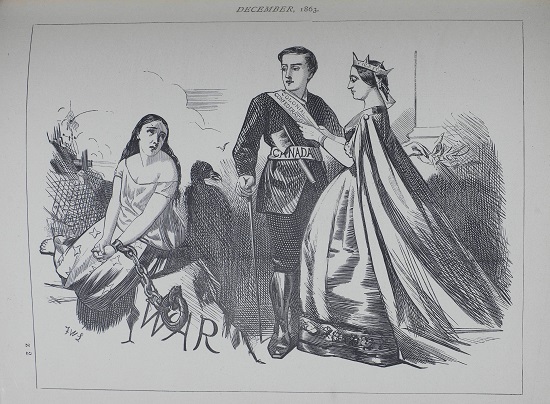
Rapp’s Comic Almanac 1844 (1843)
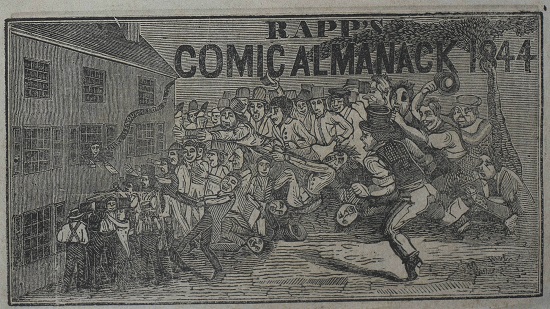
Rapp’s Comic Almanac contains all of the standard information concerning eclipses, tides, moon phases, and key religious observations, and plumps this dry matter with jokes and comic sketches. Not all of the jokes may resonate today—for example:
“I say, Bill, what makes that feller so bald-headed.”
“Why, don’t you see—his hair all turned the other way, and come out on his chin.”
“Oh! my sins! so it has—but I say, I wonder if it found it hard work getting through!”
“No—guess not—it’s so soft all about there that you can stick your finger in and never feel nothing.”
Others ooze with racism.
Heavy Talk.—“Look here, Sam Jonsing, is you gwoin to tha theater tonight?”
“No—is you?”
Dat I is. Don’t you see de great ‘traction dere on de bill?”
“Yes, I doos. Say, nig, what’s de name ob dat big piece down dere at de bottom?”
“Well, I can’t zackly specemfy de name ob dat piece, but dey say it’s one dat possesses de biggest kind of interestariety.”
“Dat’s enuff—dat last ‘spression of yours conwinces me—I’m gwoin.”
The text is adorned with illustrations. Still, much of the humor may be elusive.
Oh, my dear sir!” said a sufferer to a dentist, “that is the second wrong tooth you’ve pulled out.” [“]Very sorry, indeed,” said the dentist, “but as there were only three altogather, when I began, I’m sure to be right next time.”
[“]I shall be home next Sunday night,” the young lady said, when she followed her beau to the door, who seemed to be somewhat wavering in his attachment. “So shall I,” was the reply.
A lady looking at some stockings in a dry goods store, inquired of the clerk, who was a raw lad, how high they came. The clerk very seriously answered “I never tried them on, but believe they will reach above the knees.”
A Housemaid, who was sent to call a gentleman to dinner, fond him engaged in using his tooth brush.
“Well is he coming?” said the lady of the house as the servant returned.
“Yes ma’am, directly, he’s just sharpening his teeth,” was the reply.
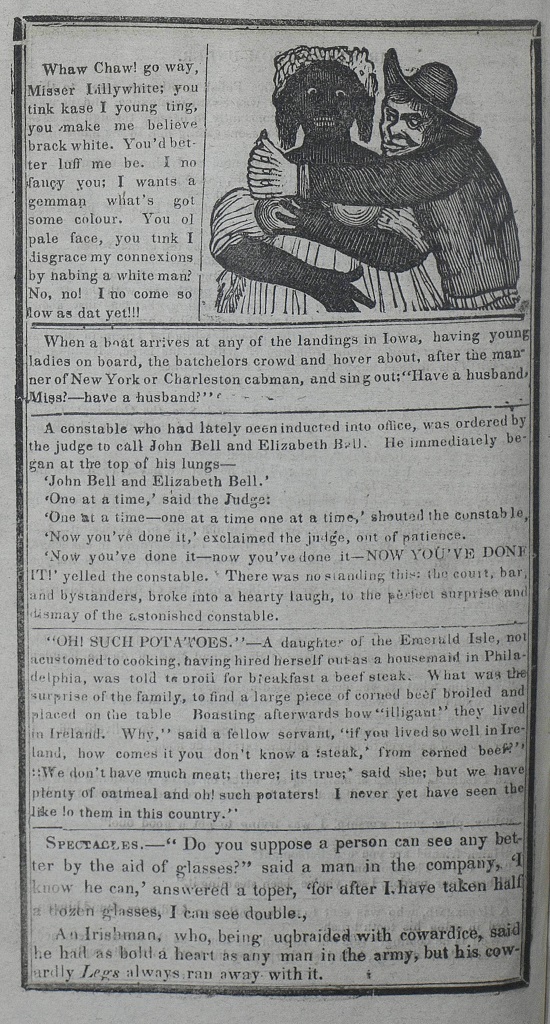
For more information about Afro-Americana Imprints, 1535-1922, or to request a trial for your institution, please contact Readex Marketing.



